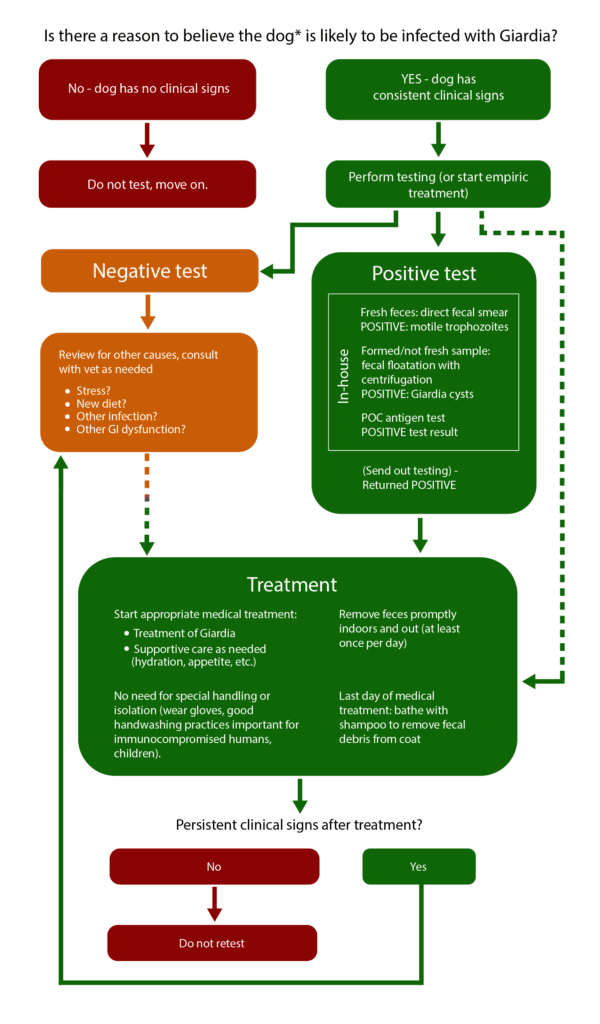Giardia is a microscopic, single-celled protozoal parasite that infects the intestines of dogs, causing a condition known as giardiasis. It’s important to note that certain strains of Giardia can also affect humans, and an infected dog might not always display symptoms, posing a risk of unknowingly transmitting the parasite to you and your family. Giardia protozoa are prevalent worldwide, and giardiasis is a common intestinal parasitic disease in the United States, affecting millions of people annually. In dogs, the infection is also widespread, with some populations, such as those in kennels, experiencing infection rates of up to 45%. Puppies under one year old and immunocompromised dogs are particularly susceptible to symptomatic giardia infections.
The parasite thrives in the small intestine, where it multiplies. While giardiasis can lead to diarrhea, the exact mechanisms are not fully understood by veterinarians. A hallmark symptom of giardiasis is foul-smelling, soft to watery diarrhea, often tinged green and sometimes containing blood. Dogs may also experience abdominal discomfort. The prognosis for dogs infected with Giardia is generally good; however, puppies, senior dogs, and those with compromised immune systems face a higher risk of complications, which can be severe. While not typically a veterinary emergency, puppies and dogs exhibiting severe diarrhea require immediate emergency veterinary care to prevent dehydration.
Symptoms of Giardia in Dogs
When symptoms of Giardia infection are present in dogs, they can manifest in several ways:
- Sudden onset of foul-smelling, greenish diarrhea
- Lethargy and a general lack of energy
- Decreased appetite, with the dog showing less interest in food
- Abdominal discomfort and tenderness
- Unexplained weight loss
Causes of Giardia in Dogs
Giardia has a two-stage life cycle: the trophozoite (developing stage) and the cyst stage. The cysts are shed in the feces of infected dogs and contaminate the environment. Dogs become infected by ingesting these cysts from contaminated surfaces, through contact with an infected dog’s hindquarters, or by drinking contaminated water. Once ingested, the cysts pass through the dog’s digestive system and are shed in feces within five to 12 days. These cysts are resilient and can survive for several months in soil and water.
The species responsible for infection in dogs is Giardia duodenalis. This parasite is further classified into different subtypes called assemblages. While most assemblages are host-specific, some can infect both animals and humans. Although dogs can transmit Giardia to their owners, the primary source of human infection is typically through the ingestion of contaminated water or food.
How Veterinarians Diagnose Giardia in Dogs
Diagnosing Giardia in dogs involves a comprehensive approach by veterinarians, starting with a detailed medical history and a thorough physical examination. It is crucial to inform your vet about any potential exposure your dog may have had to toxins or other parasites. Additional diagnostic tests may include:
- Fecal Testing: Standard fecal tests used to detect common intestinal parasites like roundworms and hookworms may not always identify Giardia. More advanced diagnostic tests are available, and sometimes repeated testing over several days is necessary for an accurate diagnosis.
- Parvovirus Testing: For puppies or unvaccinated dogs, your veterinarian might recommend a parvovirus test to rule out this serious viral illness.
- Blood Work: A complete blood count (CBC) and biochemistry profile can help your veterinarian assess your dog’s white and red blood cell counts, platelet levels, electrolyte balance, organ function, and hydration status.
Treatment and Management of Giardia in Dogs
The primary goals of treatment for Giardia in dogs are to resolve diarrhea and alleviate abdominal discomfort. Treatment strategies often involve addressing the specific symptoms and eradicating the parasite.
Most dogs fully recover from Giardia within five to eight days. A follow-up fecal test, conducted 24 to 48 hours after treatment completion, is recommended to confirm that cyst shedding has ceased. During treatment, some dogs may benefit from the addition of probiotics or fiber supplements to their diet.
Given that Giardia can be transmitted to humans, taking precautions is essential. Frequent handwashing, especially after handling your dog or their feces, is critical. Prompt removal of fecal matter from the environment is also important. Individuals with weakened immune systems and children are at a higher risk of infection, so they should avoid cleaning up after your dog.
Prevention of Giardia in Dogs
Preventing Giardia in dogs involves several key strategies:
- Vigilant Monitoring: Supervise your dog closely in public areas like dog parks to prevent them from ingesting feces or contaminated materials.
- Regular Wellness Exams: Schedule routine veterinary check-ups to allow your veterinarian to detect and address potential health issues, including intestinal parasites, before they become serious.
- Year-Round Parasite Prevention: While medications like Heartgard® and Simparica TRIO are effective against other parasites, they do not protect against Giardia. However, preventing other parasitic infections can strengthen your dog’s immune system, making them less susceptible to Giardia.
- Vaccination: A Giardia vaccine is available and can help prevent infection. Discuss with your veterinarian whether this vaccine is appropriate for your dog.
Giardia in Dogs FAQs
How long does it take for Giardia to go away in dogs?
With appropriate treatment, Giardia in dogs typically resolves within five to eight days. However, some infections can be more resistant and may require a longer course of treatment.
Can I get Giardia from my dog licking me?
While Giardia can be transmitted between species, most Giardia types are host-specific, and transmission from dogs to humans is not common. Nevertheless, it’s always wise to practice good hygiene, such as frequent handwashing and prompt feces removal, especially if your dog is unwell. Avoid letting children or immunocompromised individuals clean up after your dog.

